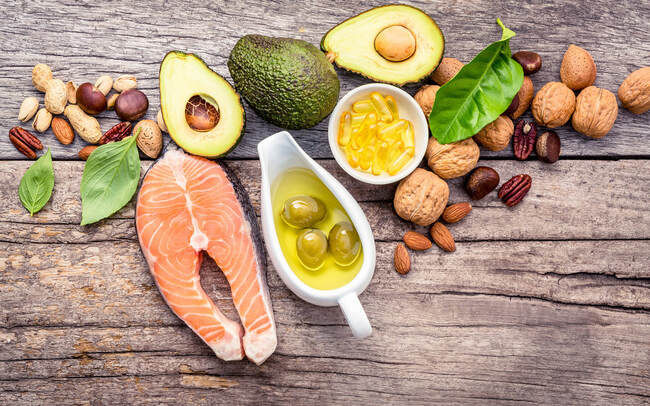FatsTake a trip to your local supermarket and you’ll no doubt see shelves full of products advertising the fact that they are 'diet' or contain little to no fat. But the reality is, dietary fats are exactly what you do want to be consuming on a regular basis. The Benefits of Fat Consumption
The Types of FatsTrans Fats: Known to be highly harmful to our health; they create inflammation, greatly increasing the risk of heart disease and other chronic conditions. These fats have been banned across many countries, but not yet in the U.K. Saturated Fats: Commonly found in most people’s diets, often in excess. Typical sources include red meat, whole-milk dairy products, & confectionary products such as biscuits, cakes, and pastries. Whilst saturated fats in moderation aren't necessarily harmful to health, a diet rich in saturated fats raises LDL cholesterol in the blood, potentially leading to an increased risk of heart disease or stroke. It’s therefore recommended that saturated fat intake is limited; no more than 20g per day for women & 30g per day for men. Unsaturated Fats: These are recognised as being healthy fats and can be split into two categories: monounsaturated and polyunsaturated. Monounsaturated fats were first discovered to be beneficial to health during the Seven Countries Study in the 60’s. The study revealed that people living in Greece & across the Mediterranean had very low rates of heart disease, despite a high-fat diet. The main fat source of their diet was olive oil – consisting of predominantly monounsaturated fats. Other sources of monounsaturated fats include: avocados, seeds, sunflower oils, and nuts. Polyunsaturated fats are essential fats, meaning that the body can't make them naturally; you must get them from food. They are vital for cell vitality, and play an important role in muscle movement and the reduction of inflammation. They help prevent & even treat heart disease and stroke. Polyunsaturated fat food sources include: fatty fish (Salmon, Tuna, mackerel, & sardines), flaxseeds, walnuts, and canola oil. Moving Forward: What Can You Do?Read the Labels. Don’t fall prey to the trappings of the food industry. More often than not, food products advertised as low-fat are not as healthy and beneficial as they claim to be; they're often full of sugar & additives.
Consume the right fats. If you’re looking to better your health, consuming plenty of food sources containing polyunsaturated & monounsaturated fats is the way to go. This, whilst also limiting your saturated fat intake to the recommended levels, is key. Sources: https://www.health.harvard.edu/staying-healthy/the-truth-about-fats-bad-and-good |
Author
Christian Lawal Personal Training.
Personal training in Tunbridge Wells, Tonbridge & Sevenoaks. Archives
January 2024
|


